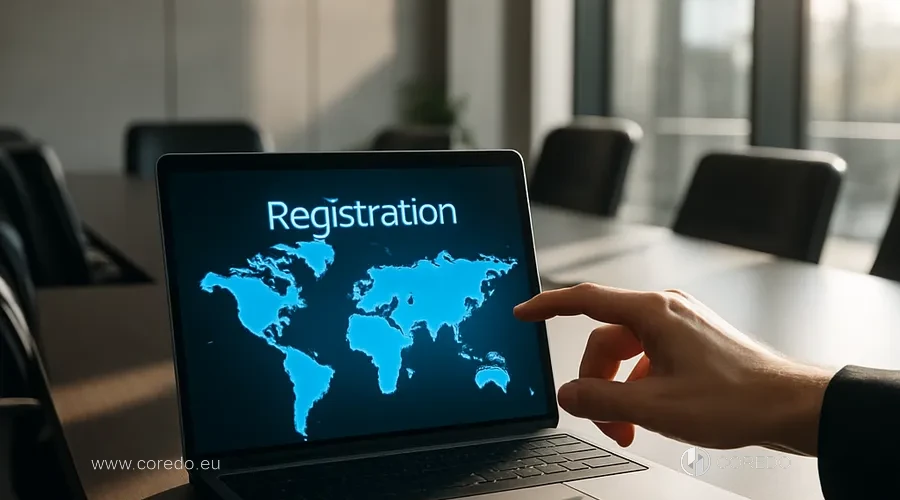In today’s world, where time-to-market and flexibility of corporate structure determine success, choosing a country for an IT business becomes not just a formality but a key driver of scaling, tax optimization and access to venture capital. The jurisdiction affects not only legal safety, but also the ability to open bank accounts, obtain licenses, protect software and personal data, as well as the long-term resilience and reputation of the business.
If you want not only to avoid mistakes but to gain a strategic advantage, I recommend reading the article to the end. Here you will find not only a systematic overview of the best jurisdictions for IT companies, but also concrete solutions that already work for our clients in the EU, Asia and the CIS.
How to choose a jurisdiction for an IT company

The choice of jurisdiction for an IT company is a strategic decision that affects business development, scalability, tax burden and access to foreign markets. When analyzing jurisdictions, it is important to consider their tax regimes, incentives for the IT sector and conditions for international activity in order to select the optimal country to register your company.
Taxes and incentives for IT companies
Tax burden optimization: one of the most common requests COREDO’s team handles when registering IT companies abroad. Corporate taxation for IT businesses ranges from 0% on reinvested profits in Estonia to 17% in Singapore and 12.5% in Cyprus. The key factor is not only the tax rate, but also the presence of Double Taxation Avoidance Agreements (DTA), R&D incentives, and other supports for innovative companies.
For example, a solution developed at COREDO for a SaaS company from Lithuania allowed using local tax incentives to finance software development, as well as structuring a holding with subsidiaries in Estonia and Portugal to optimize tax residency and protect intellectual property.
When choosing a country for an IT business, it is important to consider:
- The corporate tax rate and availability of incentives for IT companies
- Double Taxation Avoidance Agreements (DTA)
- Tax incentives for R&D and innovation
- Possibility of tax optimization through hybrid structures (holding + operating company)
Compliance, AML, KYC and substance – what is it?
COREDO’s practice confirms: compliance requirements and AML for IT companies are becoming increasingly stringent, especially in the EU, the UK and Singapore. Substance requirements, the demands for a company’s real presence (office, employees, local director): are critical for recognition of tax residency and opening bank accounts.
For example, when registering an IT company in Singapore it is necessary to appoint a local resident director, and banks require confirmation of substance and completion of KYC/AML procedures to open a corporate account. Automation of compliance and implementation of international AML/KYC standards is a mandatory step for fintech and blockchain projects, as well as for companies working with cross-border payments.
Key points:
- KYC/AML requirements for IT companies
- Substance requirements: office, local director, employees
- Automation of compliance and Due Diligence of the jurisdiction
- Impact of the automatic exchange of tax information (CRS)
Thus, tightening compliance and the development of international standards directly affect the requirements for presence and operational activity of IT companies in key jurisdictions; next we will consider licensing and regulation issues.
Licensing and regulation of IT companies
For fintech companies, crypto startups and projects in the digital assets sphere, Licensing becomes a strategic issue. COREDO’s team has implemented projects to obtain licenses for payment services, forex, crypto and blockchain activities in Estonia, Lithuania, Cyprus, Singapore and the UAE.
Cryptocurrency regulation and digital asset rules vary by country: for example, Gibraltar and Malta have progressive licensing regimes, while Singapore requires compliance with the strict requirements of the Monetary Authority of Singapore (MAS). For blockchain projects it is important to consider not only licenses but also the legal status of tokens, corporate governance requirements and data protection.
Opening a bank account: procedure and conditions
Opening a bank account for an IT business is one of the most complex stages of international registration. Bank scoring, currency control, substance and compliance requirements — all of this affects the speed and possibility of opening a corporate account.
Our experience at COREDO has shown that banks in Estonia and Lithuania willingly open accounts for IT companies with a transparent structure and confirmed substance, whereas in Singapore and Hong Kong the process can take up to 2–3 months and require the director’s personal presence. In the UAE and Cyprus banks impose requirements on minimum authorized capital and corporate structure.
Impact of reputation on access to investments
Reputation of the jurisdiction for IT companies directly affects access to investments, venture financing and opportunities to exit to interinternational markets. For example, a British LTD or an Estonian OÜ are perceived by investors as transparent and reliable structures, whereas offshore jurisdictions (Belize, BVI) may raise questions during due diligence and complicate account opening.
Technology clusters, accelerators and special economic zones are additional factors that can accelerate the development and scaling of an IT business. A solution developed by COREDO for a startup from Portugal enabled obtaining grants for R&D and access to European accelerators.
Online intellectual property protection
Protection of software, patents and trademarks: a fundamental issue for IT companies. The EU, the United Kingdom and Singapore have developed intellectual property protection systems, and the GDPR and digital identification (e-Residency) provide a high level of personal data security.
Remote management of an IT company has become a reality thanks to the digital infrastructure of Estonia and Lithuania, where you can register a business, manage accounts and file tax reports online.
Where to open an IT company in 2025

Opening an IT company in 2025 is not only about finding technological solutions, but also choosing a country with a favorable ecosystem, support for startups, optimal tax policy and access to international markets. The decision of where to open an IT company in 2025 can directly affect your profit, growth prospects and access to talent.
Best European countries to relocate to
Estonia – a leader in digital infrastructure, e-Residency and remote management. Corporate tax – 0% on reinvested profits, substance requirements are minimal, account opening is possible online. Lithuania: a fintech startup hub, a developed licensing system for payment services, access to EU markets. Cyprus – low tax rate (12.5%), benefits for IP companies, DTA with most EU countries. Poland and Portugal – attractive tax incentives for R&D, startup visas, support from accelerators.
United Kingdom – a stable legal system, flexible corporate structures, a high level of intellectual property protection and access to venture capital.
Thanks to these advantages of European jurisdictions, more and more companies are turning their attention to leading Asian hubs – Singapore, Hong Kong and the UAE.
Asia: business in Singapore, Hong Kong, UAE
Singapore – one of the most transparent and regulated markets for IT and fintech companies. A local director is required, minimal authorized capital, strict AML/KYC requirements, licensing for fintech and crypto startups. Hong Kong – a quick entry to Asian markets, developed banking infrastructure, flexible tax system. UAE: free economic zones, benefits for IT companies, possibility of 100% foreign ownership, developed startup support.
Georgia and Armenia: differences and ties with the CIS
Georgia – low taxes (5-15%), special IT zones, simple company registration, minimal substance requirements. Armenia – support for startups, tax incentives, access to CIS and Middle Eastern markets.
Company registration: USA, Australia, Gibraltar
USA (Delaware): a popular jurisdiction for venture IT projects, hybrid structures (LLC + C-Corp), a developed intellectual property protection system. Australia – a stable economy, support for innovation, flexible corporate structures. Gibraltar, progressive regulation of crypto and fintech activities, benefits for IT companies.
Comparison of jurisdictions for IT companies
| Country | Corp. tax | AML/KYC | Account opening | Licenses | Features |
|---|---|---|---|---|---|
| Estonia | 0% on reinvested profits, 20% on dividends. | Medium | Online | No | e-Residency, remote management |
| Singapore | from 4% | High | Difficult | Required | Fintech, access to Asia |
| Cyprus | 12.5% | Medium | Easy | No | DTA, benefits for IP |
| Georgia | 5-15% | Low | Easy | No | IT zones, low taxes |
| United Kingdom | 19% | High | Medium | No | Venture funding, IP protection |
| UAE | 0-9% | Medium | Easy | Required | Free zones, startup support |
Registration of an IT company in the EU, Asia and Africa

Registering an IT company in the EU, Asia and Africa is not only associated with formal procedures, but also with the need to comply with the specific requirements of each jurisdiction. It is important to consider issues of real presence and the so-called substance – they often become key for obtaining a license, opening a bank account and the further functioning of the business.
Requirements for real presence and substance
In the EU and the United Kingdom substance requirements include having an office, a local director and employees. In Estonia and Lithuania the requirements are minimal: a legal address and a nominee director are sufficient. In Singapore: a mandatory local director, a corporate secretary and an office. In the UAE: the possibility of 100% foreign ownership without a local partner in free zones.
Immigration and relocation of specialists
Startup visas and immigration programs are an important tool for relocating IT specialists. Portugal, the United Kingdom, Lithuania and Estonia have special visas for startups and investors, support from accelerators and grant programs. COREDO’s solution for a fintech company from Poland allowed relocating the team through a startup visa and gaining access to European markets.
Corporate governance and asset protection – how to ensure them?
Corporate governance (corporate governance), the foundation of long-term development of an IT company. The EU and the United Kingdom have strict requirements for transparency of structure, reporting and protection of beneficial owners. intellectual property protectionintellectual property is ensured through the registration of patents, trademarks and licenses, and exit strategy, through hybrid structures and holdings.
At the same time, when registering an IT company it is important to take into account a number of legal risks that are discussed in detail in the following section.
Legal risks of registering an IT company

The legal risks of registering an IT company affect not only the choice of corporate structure and taxation issues, but also compliance with international standards such as AML/KYC and CRS. For modern IT businesses it is especially important to comply with financial control and tax information exchange rules in order to avoid fines and possible blocks to operations.
AML/KYC and CRS tax information exchange
International AML/KYC standards and the automatic exchange of tax information (CRS) are key challenges for IT companies operating in multiple jurisdictions. COREDO’s practice shows that compliance automation and compliance outsourcing help minimize the risks of account blocking and refusal of service.
Currency restrictions and banking risks: what is important to know?
Currency control and restrictions on capital outflows: a critical aspect for IT companies working with cross-border payments. In the EU, the UK and Singapore currency risks are minimal, while in some offshore jurisdictions there may be restrictions on international transfers and profit repatriation.
Consequences of choosing a jurisdiction for business
The choice of jurisdiction affects the company’s reputation, the ability to pass due diligence, access to investments and exit strategy. Offshore structures may raise questions from banks and investors, while transparent jurisdictions can speed up scaling and enter new markets.
How to choose a jurisdiction for an IT company

Choosing a jurisdiction for an IT company is a strategic step that determines the possibilities for scaling the business, its tax burden and the level of protection of intellectual property rights. Where you register your project affects the conditions for doing business, access to financing and even reputation on the international market. Below we will explain how to choose and register an entity taking these factors into account.
How to choose and register an entity
- Assess the strategic goals of the business – scaling, taxes, access to investments, asset protection.
- Compare tax and compliance conditions – rates, incentives, AML/KYC requirements.
- Check substance and banking infrastructure, office, local director, possibility of opening an account.
- Analyze the risks and reputation of the jurisdiction: due diligence, currency control, reputational risks.
- Conduct legal due diligence, compliance with requirements, intellectual property protection.
- Obtain the necessary licenses and open accounts – fintech, crypto, payment services.
- Organize corporate governance – structure, reporting, protection of beneficial owners.
Conclusions and advice for entrepreneurs
The best countries to register an IT company in 2025 are Estonia, Lithuania, Cyprus, Singapore, the UAE, the UK, the USA (Delaware): they offer optimal conditions for tax optimization, compliance and intellectual property protection.
COREDO’s practice confirms: risk minimization, faster registration and compliance can only be achieved with an integrated approach – from analyzing strategic goals to compliance automation and organizing corporate governance. A reliable legal and financial partner is the key to successful international operations of an IT business.